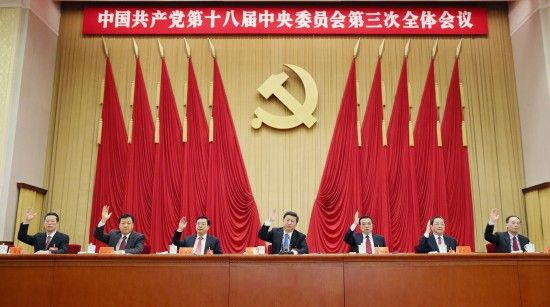Highlights of China's comprehensive reforms
- By Lin Liyao
 0 Comment(s)
0 Comment(s) Print
Print E-mail China.org.cn, November 14, 2013
E-mail China.org.cn, November 14, 2013
|
|
|
The Third Plenary Session of the 18th CPC Central Committee was held from Nov. 9 to 12 in Beijing. [Xinhua] |
The Third Plenary Session of the 18th CPC Central Committee closed on Tuesday. During the four-day meeting, The Chinese leadership approved a decision on "major issues concerning comprehensively deepening reforms".
In an interview with Xinhua.com, Professor Song Shiming of the Chinese Academy of Governance, identified two highlights in the reform plan.
The first is the general objective. According to the communiqué issued after the session, the general objective of the reforms is to improve and develop socialism with Chinese characteristics and modernize the country's governing system and capabilities.
Song said, "the country's governing system and capabilities here refers to shared governance between the government and society. The two sides should make more efforts to strengthen communication, coordination, collaboration and cooperation."
The second highlight is that the development and reform mentioned in the scheme are consistent with each other. Of the five areas of reform, economic reform is the key, and the core solution is a proper relationship between the government and the market, allowing the market to play a decisive role in allocation of resources and allowing the government to facilitate this.
Zhou Tianyong, deputy director of the International Institute for Strategic Studies at the Party School of the CPC Central Committee, also expressed the three highlights in his point of view.
"I think the first highlight is the three characteristics---- the reform is overall, comprehensive and coordinated. Secondly, the reform will guide our development over the next decade years. Thirdly, we will face more difficult and complex problems in the future."
"The first problem will come from interest groups; the second how to open up further, such as in the Shanghai Free Trade Zone; the third is resistance in people's thinking about reform," said Zhou, "We should free our minds to accept new ideas during the reform process.




 Add your comments...
Add your comments...

